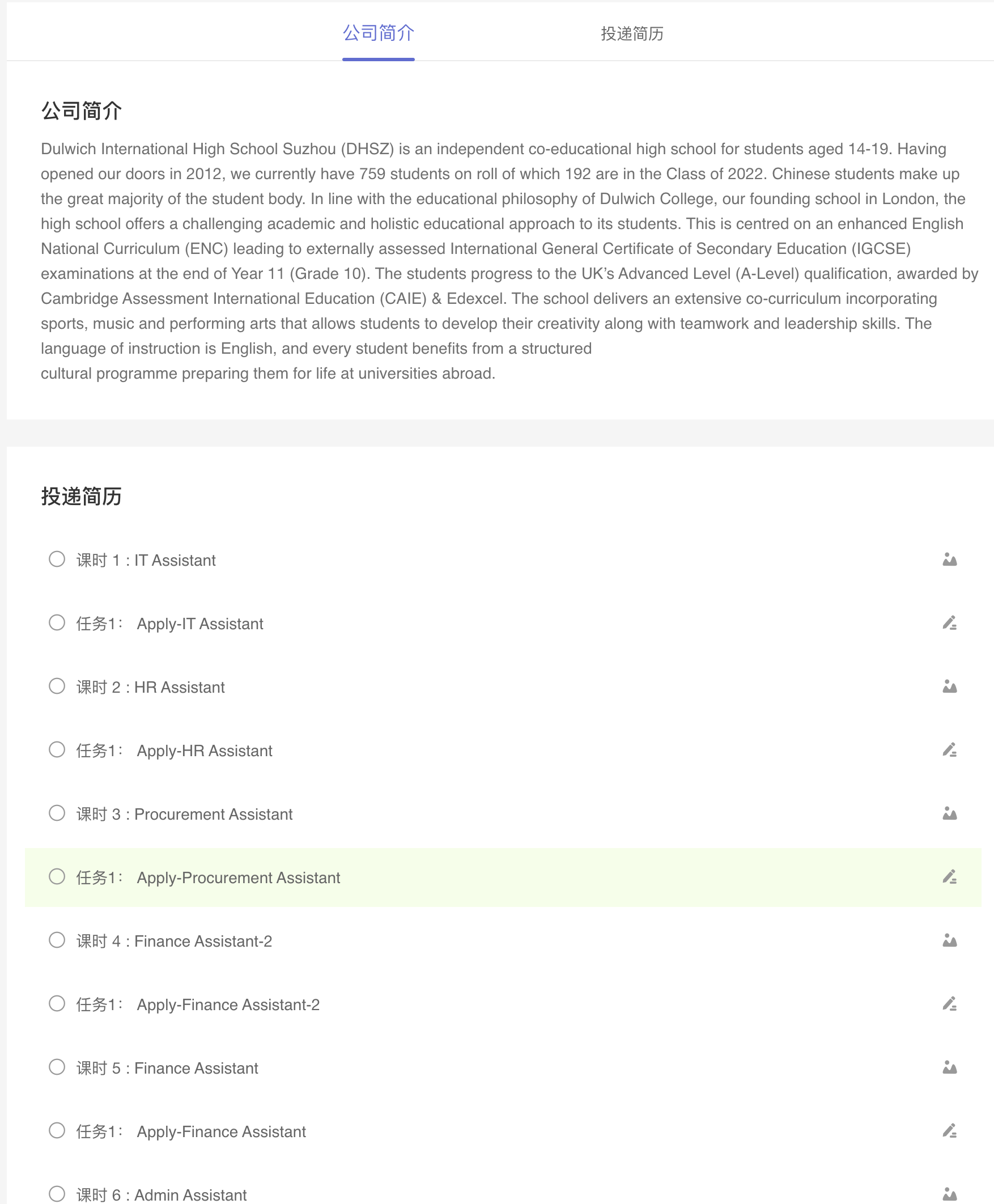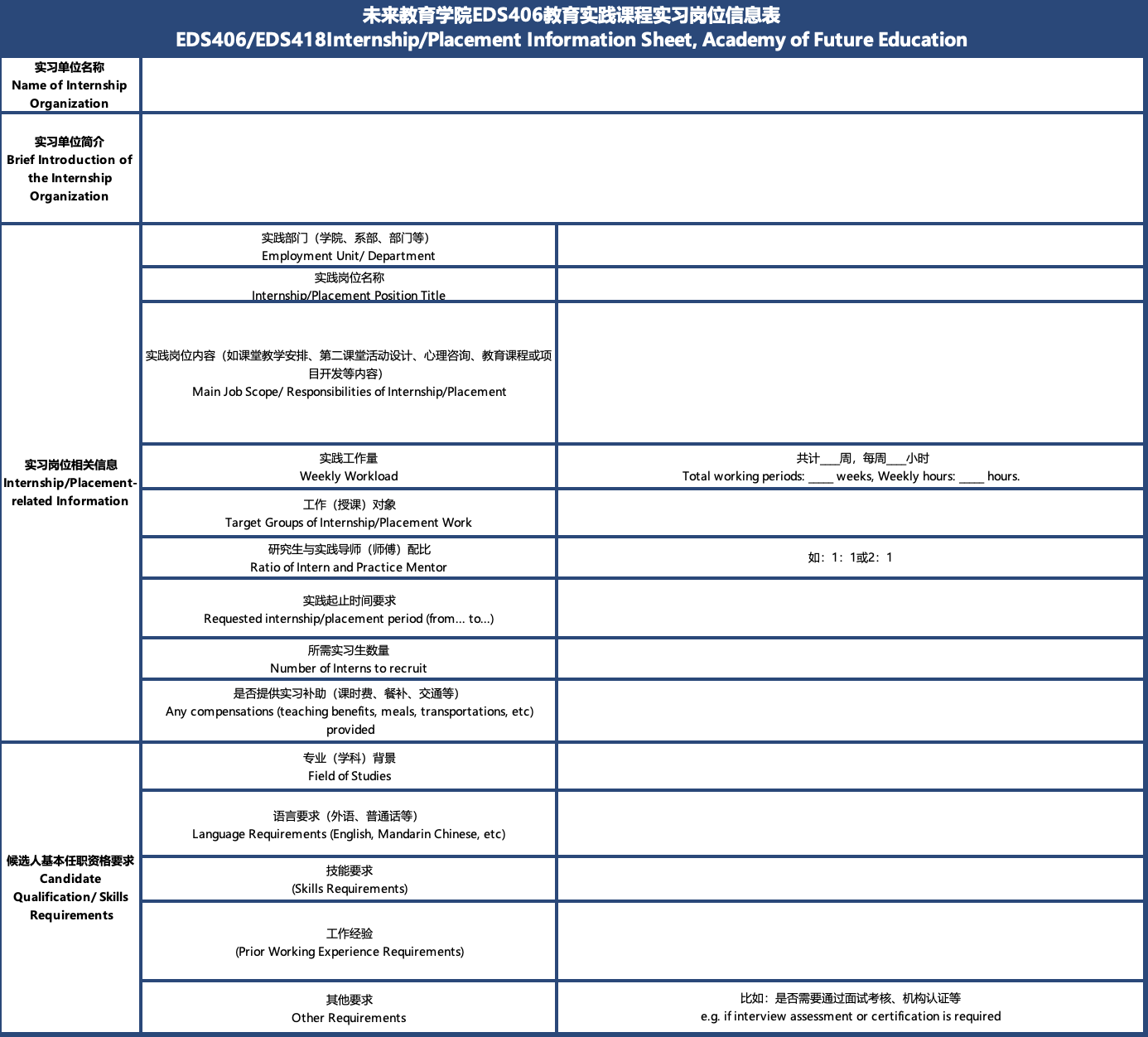The article discusses the implementation of a digital platform designed to connect postgraduate students with external internship host organizations. With the overarching goal of enhancing student learning and fostering partnerships in student development, this platform represents a collaborative effort between The Academy of Future Education (AoFE) and Learning Mall (LM). Collaboratively developed and optimized for the MA Global Education program, this platform caters to the needs of 80 postgraduate (PG) students.
1. Overview of EDS406 Educational Internship Module
The EDS406 Educational Internship module is a 5-credit bearing Master's degree course in the MA Global Education program offered by AoFE. The module aims to equip students with the analytical skills for understanding global education and exploring diverse educational topics. The module focuses on local education practices and draws on the experiential knowledge of Xi’an Jiaotong-Liverpool University (XJTLU) to promote educational innovation and sustainable development. The module is important for identifying and assessing students' graduation attributes. In semester 2, AY22-23, 80 PG students were placed in 15 Suzhou local host organizations, encompassing universities, vocational colleges & schools, and primary & secondary schools. The internships involve various tasks such as teaching, project and program development, research assistance, counseling, and administration.
2. Challenges to be addressed for the successful delivery of the EDS406 module
Given the word limit, this article will only discuss reflections on the EDS406 educational internship module before its implementation and delivery. It will focus on the collaborative problem-solving efforts between AoFE and LM. Three major challenges arose before the actual module delivery.
a. How can we ensure fairness, reasonableness, and efficiency in the matching of students and internship units?
To ensure fairness, reasonableness, and efficiency in matching students with internship units, we need to address the information gap and cognitive biases between them. The information gap manifests as a lack of comprehensive understanding, wherein students may not fully grasp the nuances of the internship host organizations, and conversely, the host organizations may lack insight into the internship needs and competencies of the students. Cognitive biases refer to students making choices without fully understanding the nature of the internship unit and job position, while host unit supervisors have different expectations for interns. An ideal scenario would involve students gaining hands-on experience in the internship unit before making a selection, but due to many constraints, this is not possible. Managing internships for 80 students is a challenging task that requires both intensive resource support and effective communication. Improving the efficiency of the matching process stands as a major challenge that needs to be addressed.
b. How can we make the most efficient use of our limited internship opportunities and job positions?
Due to the recent establishment of AoFE, a scarcity of external internship bases aligning with the specifications of the EDS406 module poses a notable challenge. If we simply open the process, students may apply to multiple internships, thereby confusing the internship units and the potential for resource inefficiencies. The consequence of students receiving multiple offers yet being constrained to a single selection introduces the risk of squandered opportunities and time. This can also affect the enthusiasm of employers when faced with rejected offers. Therefore, ensuring equitable opportunities while avoiding wasted resources presents an additional significant challenge that demands solutions before students start their internships.
c. How can we help students gain a complete internship experience and learn to make rational choices?
To help students gain a complete internship experience and learn to make rational choices, three key stages should be included. Before the internship, students are required to engage in activities such as searching and evaluating potential internship positions, submitting applications participating in interviews, and ultimately making decisions on accepting assignments. During the internship, students are expected to manage the overall arrangement of their time, understand the expectations of the internship unit, find their place in a dynamic workplace, and balance routine work with valuable experiences. After the internship, a reflective phase ensues, wherein students analyze their experiences, devise solutions for typical challenges encountered, and prepare for future career choices. The primary challenge for the EDS406 module lies in the adjustment and optimization of the curriculum to effectively support students in achieving these goals.
3. Innovative approaches, satisfying outcomes and practical implications
In response to the aforementioned challenges, the module leader proactively engaged with colleagues from LM. Subsequent discussions resulted in the proposal of a viable remedy known as the LM Premium platform. This solution not only improved communication and management within the EDS406 module but also benefited PG students participating in the ‘internship double selection’. The experiences and practices employed in the development of the EDS406 educational internship module offer valuable lessons applicable to similar courses at XJTLU and potentially extend to other universities.
a. Innovative solutions
To address various issues related to information gaps, biases, resource utilization, decision-making, and effective communication in the EDS406 module, the module leader and the LM team collaborated to develop a designated ‘internship management platform’ (IMP) (Figure 1). This innovative platform facilitates direct interactions between students and representatives from both internal and external internship organizations. Furthermore, it serves as a comprehensive tool allowing students, internship organizations, and module teachers to track the entire application process on the platform.

In addition, the module leader created a bilingual version of an internship job information form and sent it to collaborating institutions, accompanied by a request for comprehensive details about the internship opportunities, including organization details, job requirements, duration, and other relevant information (Figure 2). This information was made available on an exclusive IMP ensuring transparency. Within the IMP, internship host organizations gained the capacity to review student applications and issue announcements. The IMP also institutes limitation, allowing students to apply for a maximum of three positions, (one application at a time until acceptance/ rejection results are determined).

The IMP systematically documents all interactions between students and internship organizations, providing a comprehensive record of application statuses and interview outcomes. This serves as a valuable tool for instructors, students, and employers to track the progress of internship matching and identify any issues or difficulties. Additionally, IMP enhances students' and employers' awareness of following up on matching progress. Most importantly, the IMP ensures fairness and efficiency, empowering students to make well-informed choices regarding their internship selections.
b. Outcomes and insights
LM-IMP plays a pivotal role in quickly and efficiently helping match 80 graduate students with internship positions. Instances of students who hadn't received interview notifications proactively sought instructors’ assistance, leading to an increased sense of autonomy. As revealed in a verbal survey conducted in class, the majority of PG students chose their internships based on career goals and guidance from peers and family.
The collaborative venture between AoFE and LM has illuminated three key insights. Firstly, learning transcends traditional educational settings, extending into a variety of contexts throughout our lives. PG students' learning experience extends beyond the classroom and involves active information-seeking, outcome evaluation, and autonomous decision-making. Secondly, the utilization of information-sharing platforms such as the LM-IMP proves to be the optimal choice for resource-intensive courses with multiple stakeholders and diverse students. The LM-IMP serves as an efficiency and accuracy-enhancing tool for instructors, alleviating manual workload burdens and enabling a heightened focus on curriculum design, student engagement, and assessment optimization. Furthermore, it facilitates tracking and measuring student learning experiences through data recording. Lastly, instructors are encouraged to embrace digitalization and integrate the LM platform into their teaching and assessment, using features such as progress checks, customized learning storage, and student portfolio presentations.



